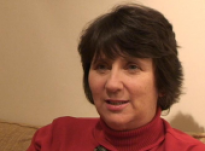Karen - Interview 05

More about me...
In 1997 a mole on Karen’s foot was diagnosed as melanoma (a form of skin cancer). It was removed, but the melanoma returned in 1999 and she had another operation. She was given the all-clear in 2005, but only a few months later started getting stomach pains. It was discovered the cancer had spread to her small intestine and other organs, so she was recommended for chemotherapy. She was offered a chance to take part in a clinical trial, in which she would be allocated at random either to the existing treatment or a new drug.
Having cancer left Karen feeling that she had lost control. She feels taking part in research helped her regain control and fostered a stronger relationship with the team caring for her.
Having cancer left Karen feeling that she had lost control. She feels taking part in research helped her regain control and fostered a stronger relationship with the team caring for her.
I think you feel - one of the things I think you feel when you’re diagnosed with cancer is your lack of control, your loss of control. You - I’m in a job were I control an awful lot of things, I control a lot of things that go on, I control a lot of people, a lot of processes, a lot of systems. And suddenly something is happening to you that you can’t control, and I think that is a horrible, horrible feeling. And I think that you have to build up a team around you that are sort of like Team Karen that are fighting for me to survive. And that’s your friends, it’s your GP, it’s the people at the hospice, the day hospice that I went to, it’s the people at the hospital.
Karen has taken part in clinical trials for cancer drugs before, but would be wary of a placebo-controlled trial. She would not risk taking part in a drug trial as a healthy volunteer because her health is too precious.
Karen has taken part in clinical trials for cancer drugs before, but would be wary of a placebo-controlled trial. She would not risk taking part in a drug trial as a healthy volunteer because her health is too precious.
Karen routinely gives blood and tissue samples when she is asked to at the hospital. She has melanoma.
Karen routinely gives blood and tissue samples when she is asked to at the hospital. She has melanoma.
Karen did not know how her sample was going to be used and, because of previous experience on chemotherapy trials, did not want to know.
Karen did not know how her sample was going to be used and, because of previous experience on chemotherapy trials, did not want to know.
Karen thinks if people believe medical research is sensible, safe and that the staff are trustworthy, they should take part, whether it is a clinical trial or biobanking . But it's a personal choice.
Karen thinks if people believe medical research is sensible, safe and that the staff are trustworthy, they should take part, whether it is a clinical trial or biobanking . But it's a personal choice.
Karen would prefer doctors to use their expertise to guide her decisions, rather than just giving information and leaving it up to her.
Karen would prefer doctors to use their expertise to guide her decisions, rather than just giving information and leaving it up to her.
Karen never reads the information leaflets, and would like more guidance from doctors as to what she should do. But she knows other people would not feel the same way.
Karen never reads the information leaflets, and would like more guidance from doctors as to what she should do. But she knows other people would not feel the same way.
Karen was in a trial for melanoma which also involved banking blood samples. She describes her reasons for taking part in research as 'totally selfish'.
Karen was in a trial for melanoma which also involved banking blood samples. She describes her reasons for taking part in research as 'totally selfish'.
I still go to the hospital regularly. It’s just been changed to six months, four years later. It has been three months. I went during the first year - the trial lasted a year - during the first year I went every three weeks. I had blood tests taken, I think more regularly than that but certainly every three weeks, but those were the terms of the trial. So I think that by joining in with the trial I actually got better looked after than, or more regularly looked after than I would have done had I not been on the trial.

